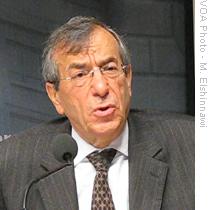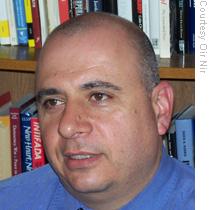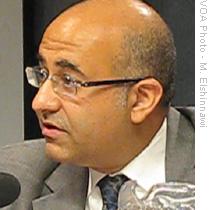Washington, D.C.
29 June 2009
In the wake of U.S. President Barack Obama's June 4th speech to the Muslim world and the Israeli prime minister's recent acceptance of a conditional Palestinian state, hopes have risen for a resumption of talks aimed at resolving the long-running Israeli-Palestinian conflict.
The current framework for an independent Palestinian state was first outlined in the 1993 Oslo Accords between Palestinians and Israelis. That agreement described the so-called "two-state solution" - Israel and an independent Palestine living peacefully side-by-side - as the best way to settle the protracted conflict.
 |
| Ziad Asali, president of the American Task Force on Palestine |
"Settlement freeze means the end of taking lands from the Palestinians and render[ing] the Palestinian state completely impractical. So it is very important that he mentioned it, that [U.S.] congressmen - when Netanyahu came here [to the United States], talked to him about it, and it is important that [Secretary of State] Hillary Clinton talked about it. So it's an important issue, and now it adds credibility to those who advocate the two-state solution."
Asali is hopeful that negotiations might resume soon. But he concedes that the current split between Hamas and the Palestinian Authority are complicating the outlook for the Palestinian half of that two-state solution.
What does two-state solution mean?
And new questions have arisen since Obama's Cairo speech about Israeli interpretations of the two-state concept and the strict conditions set forth recently by Mr. Netanyahu, just re-elected as Israel's prime minister.
 |
| Ori Nir, spokesman for Americans for Peace Now |
"I think we have already seen that happening. This administration understands that in order to get some traction on the peace process, it has to lean on both sides, both on Palestinians but also on Israel," Nir says. "We have seen that with settlements. I think the issue of settlements is something that this administration will not give up on, will continue to push for, and I think when it comes to the actual substance of the final status negotiations, this administration will also exercise its authority and put forward its ideas and perhaps even an actual plan of its own."
Israeli-Palestinian conflict key to U.S.-Muslim relations
Nir says momentum toward peace can only be generated if all parties to the conflict take the kind of bold measures for which President Obama is calling. Samer Shehata, a fellow at the Washington-based Woodrow Wilson Center for Scholars, says President Obama clearly understands that peaceful resolution of the Palestinian issue is key to improving relations between the United States and the Muslim world, from Morocco to Malaysia.
 |
| Samer Shehata, a fellow at the Washington-based Woodrow Wilson Center for Scholars |
United States in unique position to bring peace
And it is precisely the close U.S. relationship with Israel that will provide President Obama with the leverage he needs to overcome these obstacles to peace, says Aaron Miller, a public policy scholar at the Woodrow Wilson Center and a former advisor to six secretaries of state on Middle East policy and the Arab-Israeli peace process.
 |
| Aaron Miller, a public policy scholar at the Woodrow Wilson Center |
Miller says he is not discouraged by Israeli Prime Minister Netanyahu's hard-line stance on Palestine. He notes that in the past, many of Israel's most effective peace-makers have been, like Netanyahu, hawkish right-wingers, men such as Menachem Begin and Yitzah Rabin.
Miller expects President Obama will avoid confrontations with the Netanyahu government and will focus instead on his trademark "yes, we can" approach, to convince both sides of the urgent need to reach agreement. The stakes, as always, are high, Miller says: Failure to resolve the Israeli-Palestinian conflict will deepen the region's despair, weaken America's allies, and strengthen the radical forces now working to sow discord in the Middle East.